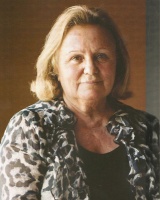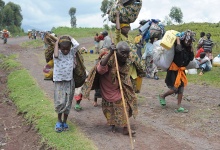Teresa Tito de Morais has included Portugal in the path of the 44 million refugees that are wandering the world today. She founded the only NGO that works in Portugal in that area . Twenty years later, the Conselho Português para os Refugiados-CPR (“Portuguese Council for Refugees”) has become a reference in its field.

Teresa Tito de Morais, photo by Jorge Simão/Expresso
Little was said about refugees, twenty years ago when Teresa Tito de Morais founded the Conselho Português para os Refugiados-CPR (“Portuguese Council for Refugees”), a Non-Governmental and Non-Profit Organization. There was a “divorce” between a poor country suddenly struck by prosperity by means of European Community funds and the non-european world of war, misery and of displacement. It was important to include Portugal in this map, because of an ethical necessity and an imperative need towards our development. Above all, the “other” also have rights. The former political exile, who has worked in this area since 1977, receives us in the reception center of Bobadela, in the outskirts of Lisbon, where the asylum seekers and refugees find their first home.
“The theme ‘refugees’ is one of the most silenced topics of the Portuguese Society”. You wrote this in the nineties. Do you still think that way?
There was an evolution and it would be a bad situation if it wasn’t that way. Today Portugal gives greater attention to the subject, although a delay in political decisions persists regarding this serious humanitarian problem which affects 44 million people. On the other hand, there is a great deal of difficulty on determining what are true refugees and what distinguishes them from immigrants. Without these concepts clearly defined, the public opinion cannot understand the necessity of offering them a differentiated and specific treatment.
What is then a refugee?
It’s a person forced to abandon her country. The immigrant, which hasn’t lost the protection of his country of origin, can make arrangements that lead to a better life elsewhere and assure some favorable conditions. The refugee loses everything: the political protection, physical security, his home and his job. He finds himself in such a vulnerable condition that his only possibility is fleeing. Many times this occurs in such a haste that he only carries the clothes that he is wearing.
“The fears about the supposed flood of refugees in industrialized countries are being exaggerated or misled with migration issues.” How do you comment this phrase by the United Nations High Commissioner for Refugees, António Guterres?
That is exactly the difference between forced migrations and the other ones. There is a huge amount of people in search of new life opportunities that come in a mix with potential asylum seekers. To halt the migrating phenomena, the industrialized countries assume an aggressive attitude and end up not determining who needs a different treatment. It must be said that Europe is one of the continents that receives fewer refugees, much less than Asia and Africa.
Asia receives 36% and Europe 23% – a percentage that decreases to 16% if we include the Palestinian refugees.
Pakistan, Syria and Iran are the countries that receive the most refugees. In the case of Pakistan, it is an extremely destitute country that has to integrate a massive influx of people in search of security – obviously many of them in truly needy conditions and living in refugee camps. In fact it is a myth to think that the refugees are invading Europe.
Can Europe do more?
It can do more and better, not only Europe in general, but including Portugal as well, although there isn’t the disregard of twenty years ago. Curiously, the first law of asylum passed in 1980 was quite generous. A hardening of the law came later, with the peak of refugees in 1993 and with the harmonization of the asylum laws within the EU (Schengen and Dublin agreements). But it is not only a problem concerning laws, but putting them into practice as well.
Why?
Because the interpretation of the law is not always favorable for asylum requests, even with safeguards that assure the fair and equitable procedure for the requests.
It is not easy to be granted a refugee status. After being able to save his own life, one must fulfill eligibility criteria, sometimes impossible to meet.
It is very difficult to have access to a procedure for claiming asylum. I make here an exception for the more vulnerable groups like unaccompanied women and minors. Luckily in the latter days, Portugal has made these procedures less cumbersome. In the other groups, sometimes we are faced with identical situations in which asylum is granted to one and not to the other, without understanding why.
 How many asylum requests has Portugal received in 2010?
How many asylum requests has Portugal received in 2010?
Portugal has accepted for review 36% of the requests, although the CPR (“Portuguese Council for Refugees”) considered that 78% should have been admitted. This doesn’t mean that 78% would have been granted the refugee status, but that their cases should have been admitted for analysis.
And how many people were granted the status?
Of a total of 160 request, 57 were evaluated by the Serviço de Estrangeiros e Fronteiras –SEF (the security service of Portugal). Of these, 6 were given refugee status and 49 were given a residence permit for humanitarian reasons. In reality, even considering the 36% admitted for analysis, the percentage of not granted status is very high. We can conclude that Portugal doesn’t receive a significant number of asylum requests, and admits very few of the ones that it receives. A measure that we consider a positive sign from the Government was to accept 30 refugees per year as of 2006 under the United Nations High Commissioner for Refugees (UNHCR) program.
You were in the foundation of the CPR council for Refugees, the only NGO in Portugal to aid the refugees and asylum seekers. What made your heart tick at the time?
When I returned to Portugal after nine years in exile in Switzerland because of the Carnation Revolution of 1974, The Ministry of Foreign Affairs at the time, Medeiros Ferreira, asked the UNHCR to open a delegation in Portugal, with the objective of creating the first law of asylum and to set apart the repatriates from the refugees. This was the phase of decolonization in which many Portuguese were returning home. The UNHCR opened the delegation in 1977 and I was invited to take part of this project. The UNHCR had a very important role in raising awareness of the refugee problem, because although Portugal had ratified the Geneva Convention in 1951, it remained apart from this situation. By the end of the eighties, the UNHCR needed to restructure its presence in various countries. To be able to exit, they proposed us to create a NGO that took in charge the operations and assistance for the attribution of the refugee status. The task to create the CPR Council for Refugees was very mobilizing, not only because it gathered a core group of personalities engaged with the possibility of Portugal filling the gap, but also because we were able to create a solid structure that provides a proper treatment.
What made you persevere in this area? Yours is a difficult work.
It’s a difficult but exciting work. There are a lot of motivational factors: on one hand, the possibility of understanding this phenomenon and to contribute for a wider understanding of the refugee problem in my country. On the other hand, to help these people (that have an amazing life story) to have a chance to carry on.
Until what point your professional experience, that of a political exiled, daughter of an exiled politician (Alfredo Manuel Tito de Morais, one of the founders of the Socialist Party), motivated you to lead this path?
It surely had a lot of influence. I was born in a family that favored humans rights as essential for democracy and liberty. I underwent the Academic Crisis (1962-1965) of the Portuguese dictatorial regime, which closed several student associations and organizations in which students were deprived of their rights and prevented to have access to an education. At the time, I was in High School, but I also was effected. I was forced to leave Portugal, being arrested on board the plane and sent to the Fort of Caxias for three months. In all, I spent 19 years in jail. I clearly understood what meant to be deprived of freedom and justice. Then I left to Lausanne, Switzerland, lived there for nine years, married and had children. We would meet with the family in Spain or in Rome, Italy, where my father lived. We returned right after the 1974 revolution.
Quite a few times you mentioned that the human rights are each time being left further behind in the political agendas. As if it was a problem of the others…
It is always a problem of the others that doesn’t affect us. There is a trivialization of situations that affect thousands of people, victims of widespread losses. The press does what is possible, but what is on the agenda are economic issues. What is lacking is a more realistic approach to society and to the conflicts that the world is undergoing and also of the obligation that we all have to intervene.
From what countries does Portugal register the most asylum applications?
Presently there is a significant number of Iraqis. We have also had citizens from Somalia, Ivory Coast, Guinea Conakry, Colombia, Democratic Republic of Congo, Guinea Bissau, Angola, Belarus, Afghanistan and Iran. Sometimes families arrive with small children, we’ve already had 25 children. Last year we received 10 unaccompanied minors. We are finishing the construction phase of a shelter for 14 beds in the Parque Bela Vista in Lisbon, that will be inaugurated in 2012.
The integration percentage of those whom Portugal grants asylum is 50%. There is still a lot of social bias regarding these people.
There is a considerable difficulty for them to find a job. And when they do, it only lasts a couple of months. The housing sector doesn’t make things any easier, mainly because contractors give very limited guarantees and the property owners simply refuse them. There are hurdles at the level of medical care, education and of obtaining equivalences to the studies made. However, there has been some progress in schools. The problem is with the adults, whose instability is passed on to their children. What we can conclude is that 60 years after the Geneva Convention, and after two world wars, the necessities of the refugees together with society’s response practically haven’t changed.
People want misery and war away from their backyards. How can you revert indifference?
By providing opportunities. These opportunities must be viewed without suspicion by those who can help. It is not only about allowing these people to earn a living, but that they bring with them their knowledge so that our country can progress. It is not by closing its borders that societies advance.
Meaning that we must do it for us.
We must face this as a necessary good for our development. It is an ethical and moral duty. To accept the other, not because he is inferior, not because we are tolerant, but because they have rights.
One of the prejudices against the refugees is that they live off the state. But who crosses a desert to save his life can only have things to give.
He has an extraordinary human potential which should be used under the risk of being wasted in a gutter, in marginality. There is a very thin dividing line.
The latest figures, given in June, point that delays occurred in the aid that Social Security provides to refugees. One of them complained: “If you cannot help us, why do you receive us?”
By restricting his access won’t help either. These people came on their own will, they are displaced people that lived in Syria and in Ukraine that didn’t have integration possibilities in those countries. Sometimes their expectancies of life in a new country are too high, therefore they need to be informed on the political and economic situation of the hosting country, in the case, Portugal. It must be said that although this country has a great willingness to help these people, it has its own internal limitations like a high unemployment rate and a series of tribulations. The CPR council acts as a mediator between them and the authorities, by attempting that the aids continue to be given, but we know that sometimes this isn’t possible. And we know something even more distressing: the EU funds that CPR receives are systematically delayed, which means that we are living on the razor’s edge – 75% of the funds for the maintenance of the reception center for refugees in Bobadela (in the outskirts of Lisbon) come from a European refugee fund.

Internally displaced Kibati villagers, photo by Wikipedia
There are 43.7 million displaced people worldwide, of which 27 million are internally displaced. Of the other 16 million, how many do in fact find protection?
The majority of them go to a refugee camp in underdeveloped countries, and only an infinite minority are able to land in an industrialized nation. The number of requests that Europe received last year didn’t attain 300.000. Only 10% were conceded the statute of refugee while 40% received other types of humanitarian protection. Doing the math, only half of the requests were accepted. Following the conflicts in Libya and Tunisia, for example, Italy received 11.000 people. However, the Mediterranean is sadly turning into a cemetery.
What do you do with the internally displaced? What must be done with Somalia?
The international humanitarian aid is of uttermost importance. To contribute for the internal security of these countries that have wealth creation possibilities. Much work must be made there since everyone wants to live in his own country. Some time ago I saw a TV program that makes us think: the coast and the sea have a huge potential for the subsistence of Somalia, but their resources are exhausted because Europe, namely France and Italy, had unlimited access to these resources. The natives will not have the right to eventual riches in their countries because it has already been depleted by others! We also have responsibilities!
There still isn’t an international legislation governing the environmental refugees. In 2008 they were estimated in 20 million while in 2050 the figure jumps to 200 million.
According to recent reports, the great cause of the existence of refugees are environmental disasters, sometimes even causing wars and armed conflicts. If we don’t figure out what can be done in terms of prevention and response to humanitarian emergencies, these numbers are going to push upwards. I’m a person with hope, but I’m concerned with the future generations. If measures are not taken, humanity is compromised.
Recently, Louise Arbour – the high commissioner for human rights of the United Nations and president of the International Crisis Group said to the newspaper “Expresso”: “the planet has never been so peaceful”. Do you agree?
I agree. But we must raise awareness because we are in an era of stagnation. The world never has been so pacific, but we still watch very aggressive armed conflicts and we must draw conclusions from history. I believe that this peaceful side has a lot of indifference. Further to that, we are forgetful.
Article written by Luciana Leiderfarb which was originally published in the “Revista Única”, a magazine supplement of the Portuguese Newspaper “Expresso” dated September 3, 2011 (pages 64-68) and translated under permission by BestInPortugal.

{ 1 comment… read it below or add one }
True, no society can progress by closing its borders, you are better off helping the refugees before they resort to desperate measures in case you neglect them.